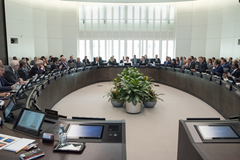IMF Executive Board Approves US$1.52 billion ECF Arrangement for the Democratic Republic of the Congo
Washington: The Executive Board of the International Monetary Fund (IMF) approved a 3-year arrangement under the Extended Credit Facility (ECF) for the Democratic Republic of the Congo (DRC) in an amount equivalent to SDR1,066 million (100 percent of quota or about US$1.52 billion). The ECF arrangement will support the authorities’ medium-term reform program aimed at maintaining macroeconomic stability, increasing fiscal space, and promoting a sustainable and private sector-led economic growth.
Approval of the ECF arrangement enables immediate disbursement of about US$216.9 million to reinforce international reserves. This follows Fund emergency support to DRC under the Rapid Credit Facility (RCF) in December 2019, and April 2020 (for budget support), for a total of SDR533 million (50 percent of quota or US$731.7 million, see Press Releases No. 19/465 and 20/182 ).
Economic activity decelerated sharply in 2020 because of COVID-19. The brunt of the pandemic was particularly felt in the non-mining economy, leading to a contraction in non-extractive GDP of 1.3 percent in 2020. Weak revenues and increased spending pressures linked to the pandemic and the free education initiative led to a sizable fiscal deficit. Inflation spiked, fueled by a rapid exchange rate depreciation, and gross official foreign exchange reserves decreased to less than two weeks of imports. A recent tightening of policies and a strong performance of the mining sector is supporting ongoing macroeconomic stabilization, but the near-term economic outlook remains uncertain and dependent on the evolution of the pandemic as well as on a stable political environment.
The DRC government has articulated an ambitious, yet realistic structural reform agenda aimed at promoting robust and sustainable economic growth. The ECF arrangement will focus on three key areas: (i) stepping up domestic revenue mobilization to increase fiscal space for infrastructure and social spending; (ii) strengthening governance including natural resource management and transparency; and (iii) reinforcing the monetary policy framework and the central bank’s independence. The ECF arrangement is expected to catalyze budget and project support from external partners.
At the conclusion of the Executive Board’s discussion, Mr. Mitsuhiro Furusawa, Deputy Managing Director and Acting Chair, made the following statement:
“The Congolese economy has been severely impacted by the COVID-19 pandemic and is recovering, in part due to high mineral prices. The authorities have requested a new arrangement under the Extended Credit Facility (ECF) to address protracted balance of payment needs and support reforms aimed at maintaining macroeconomic stability, increasing fiscal space, ensuring debt sustainability, and promoting sustainable and private sector-led economic growth. The ECF arrangement is expected to catalyze financing from external partners.
“The authorities are committed to creating fiscal space to address infrastructure and social needs, while maintaining a moderate risk of debt distress. Measures aim to enhance domestic revenue mobilization, by ensuring a properly functioning VAT, rationalizing non-tax and parafiscal charges, streamlining tax expenditures, and modernizing revenue administration. Spending discipline would help to increase social spending and avoid reliance on central bank financing. Prioritizing concessional financing and relief under the Debt Service Suspension Initiative would support debt sustainability.
“Macroeconomic policies are appropriately aimed at maintaining low and stable inflation. Important measures include modernizing the monetary policy framework and strengthening the financial position, governance, and independence of the central bank. Measures are being taken to enhance the risk-based supervisory framework and the oversight of banks. The authorities’ aim to boost foreign exchange reserves while allowing the exchange rate to act as a shock absorber.
“Strengthening governance, including natural resource management and transparency, remains crucial to support private sector-led growth. The authorities have made progress in publishing mining contracts and on COVID-19 related spending. Further efforts are needed to enhance the AML/CFT framework to meet global standards and measures to improve the resilience to climate change would be welcome.”

